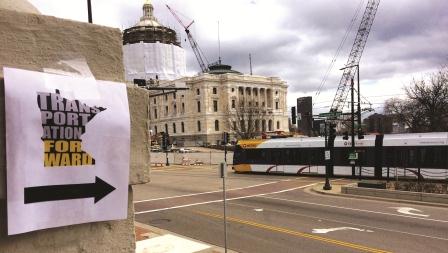 Justin Fay
Justin Fay
As the 2016 session convened in March, environmental advocates approached with very modest expectations. Last year, the Legislature took a number of steps backward on the environment, rolling back protections for clean water and weakening clean energy laws, among other misguided decisions. With the same legislators coming back for 2016, simply getting out without further damage being done would have been considered a noteworthy accomplishment.
Fortunately, things were quite different in 2016. Environmental advocates were, in fact, largely successful at preventing further rollbacks to our existing environmental laws in 2016. In a few cases, the 2016 Legislature even took a few very modest steps forward.
Holding the Line
Minnesota is fortunate to have a strong network of advocates working in support of clean energy, clean water and a healthy environment. Working alongside many partners, the Sierra Club helped to fight back against a number of proposed environmental rollbacks in 2016. Among the policies offered but not enacted in 2016 were:
- Elimination of contested case hearings over an appeal to a permit to mine decision
- Prohibition on the use of state funds toward implementation of the Clean Power Plan in Minnesota until legal challenges are resolved
- Capping contributions to the Renewable Development Fund at $10 million lifetime per cask
- Onerous new regulations designed to impede the rollout of community solar gardens
- Prohibition on any new solar project in excess of three acres if it would require trees to be cut
- Politicizing the Public Utilities Commission by turning it into an elected body
- Removing pipelines from calculation of a utility’s annual energy savings goal under the
- Conservation Improvement Program (CIP) Repeal of certificate of need requirement for new pipelines
Missed Opportunity: Transportation Funding
As in 2015, the Minnesota Legislature unfortunately missed several key opportunities to invest in making our environment better for future generations. Among the highest profile setbacks was the failure of the Legislature to pass a long term dedicated funding package for transportation.
The Sierra Club joined with dozens of partner organizations to form Transportation Forward, a broad-based coalition of stakeholders working together to advance a long-term, dedicated multi-modal transportation package for Minnesota. The lynchpin of our proposal was a ¾ cent metro sales tax for metro transit, including a set-aside for bicycle and pedestrian infrastructure as well as new funding for greater Minnesota transit.
At the beginning of the 2016 session, transportation funding bills had already passed both the House and Senate, and a conference committee had begun meeting already the previous spring. The 2015 transportation bill passed by the Senate was largely in line with the proposal put forth by our coalition. The House version, by contrast, failed to include any new funding for transit, biking or walking. Governor Dayton’s pre-session proposal was very similar to the package passed by the Senate.
Unfortunately, leaders from the House and Senate were unable to reach a deal on a compromise to allow a multi-modal transportation package to become law in 2016. A last ditch effort in the final hour of the session to include a provision that would have allowed Hennepin County to provide the “local match” for the Southwest LRT project was added to the bonding bill in the Senate but ultimately failed when time ran out on the session.
Looking Ahead to 2017
Along with transportation, the failure of the Legislature to pass a bonding bill to fund capital investment projects – including a number of important environmental projects, such as the cleanup of the St. Louis River Watershed – is likely to be a prominent issue on the election trail this fall. The entire Minnesota Legislature is on the ballot this November. As a result, the partisan composition of the Legislature entering the 2017 session is very much in doubt.
That being said, we know that important environmental decisions will continue to be made in St. Paul next year regardless of how the election turns out. Sadly, with high profile projects like PolyMet still on the horizon, attempts to weaken or circumvent existing environmental laws are likely to continue in 2017. One bright spot this year was the introduction of “Prove it First” legislation to require that companies prove an existing sulfide mine has operated and closed successfully without impairing water before a similar mine can be introduced in Minnesota. This politically challenging proposal was advanced by Sen. Chris Eaton and Rep. Alice Hausman in coordination with the Sierra Club, and we hope to continue working with these and other forward thinking leaders in 2017.
2017 will also be a budget year, and defending the resources and authority available to our state regulatory agencies will continue to be a critical need. If a bonding bill is not completed in a special session in 2016 (not scheduled as of this printing), a new bonding bill that includes significant investment in environment and natural resource protection will also be an important priority.
The Sierra Club will continue to do the important work of fighting to defend our woods and water, clean air and communities at the Legislature in 2017 and beyond.
Justin Fay is Senior Chapter Representative and legislative lobbyist for the North Star Chapter.